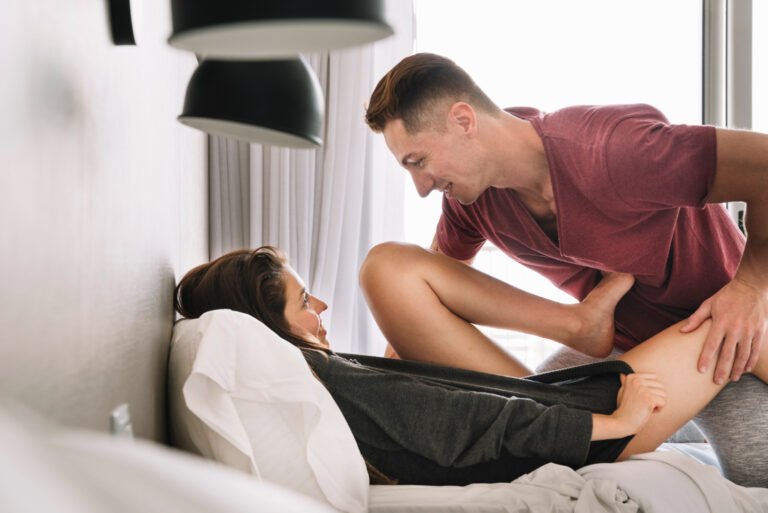
Cystitis, often called a bladder infection, can make life uncomfortable, especially for women who get it frequently. It’s caused by bacteria entering the bladder, leading to symptoms like burning when you pee, frequent urges to go, or pelvic pain. Sexual activity can sometimes trigger it, as bacteria from the vaginal or anal area can move toward the urethra. But don’t worry—choosing the right sex positions can lower the risk while keeping intimacy fun and comfortable. This article shares practical tips and the best positions to help you avoid cystitis, written in a friendly, straightforward way. Let’s dive into how you can enjoy your sex life while staying mindful of bladder health.
Understanding Cystitis and Its Triggers
Cystitis is a common urinary tract infection (UTI) that inflames the bladder. Women are more prone to it because their urethra is shorter, making it easier for bacteria like E. coli to reach the bladder. Sex can increase the risk by pushing bacteria toward the urethra, especially during vigorous thrusting or positions that put pressure on the pelvic area. Other triggers include not peeing after sex, poor hygiene, or dehydration, which lets bacteria linger. Symptoms usually start within hours—burning urination, cloudy pee, or a constant need to go. While antibiotics often clear it up, preventing cystitis is better than treating it. Choosing sex positions that reduce pressure on the urethra or limit bacterial transfer can make a big difference. Always pee before and after sex, stay hydrated, and keep communication open with your partner to ensure comfort.
Why Sex Positions Matter
The way you position your body during sex can affect how much irritation or bacterial movement happens near your bladder. Positions that involve deep penetration or direct pelvic pressure can push bacteria closer to the urethra, raising cystitis risk. On the other hand, positions that keep the pelvis tilted upward or reduce friction in sensitive areas are gentler on your bladder. It’s not about limiting your fun but about being smart with what feels good for your body. By picking positions that minimize contact between the anus and vagina or avoid heavy pressure, you can lower the chance of bacteria sneaking in. Plus, these positions often encourage closeness and communication with your partner, which is always a bonus. Below, we’ll cover specific positions that are both enjoyable and bladder-friendly, so you can focus on intimacy without worry.
Best Sex Positions to Try
Missionary with a Pillow
Missionary is a classic, but adding a pillow under the hips of the person on the bottom can make it cystitis-friendly. The pillow tilts the pelvis upward, which reduces pressure on the bladder and keeps the urethra away from bacterial sources like the anus during sex. This position allows for shallow penetration, limiting friction that might irritate the urethra. It’s great for eye contact and slow, controlled movements, letting you stay in tune with what feels right. You can adjust the pillow to find the perfect angle, and it’s easy to pause and check in with your partner. Keep things clean by washing hands or toys beforehand, and always pee afterward to flush out any bacteria. This tweak to missionary keeps things intimate while prioritizing bladder health.
Spooning
Spooning is a cozy, low-impact position where both partners lie on their sides, with the penetrating partner behind. This setup avoids deep thrusting and keeps the pelvic area relaxed, reducing the chance of pushing bacteria toward the urethra. The angle limits anal-to-vaginal contact, which is key for preventing bacterial transfer. It’s also gentle on the bladder since there’s no direct pressure on the pelvis. Spooning feels intimate with full-body contact, and you can go slow to stay comfortable. To make it even safer, use lube to minimize friction, and ensure both partners are clean before starting. Peeing after sex is a must to clear any potential bacteria.
Cowgirl or Reverse Cowgirl
Cowgirl, where the receiving partner is on top, gives you control over depth and speed, which is great for avoiding irritation. Reverse cowgirl, where you face away, works similarly. These positions let you adjust angles to keep penetration shallow and avoid bladder pressure. By staying upright, you reduce the chance of bacteria moving toward the urethra. Plus, you can pause or shift easily if anything feels off. Use plenty of lube to keep things smooth, and communicate with your partner about what feels good. Wash up before sex, and make sure to pee afterward to flush out any bacteria. These positions are empowering and fun while keeping your bladder in mind.
Additional Tips to Prevent Cystitis
Beyond choosing the right positions, a few habits can further lower your cystitis risk. Drink plenty of water daily to keep your bladder flushed. Pee before and after sex to clear bacteria from the urethra. Avoid irritants like scented soaps or douches, which can disrupt vaginal balance and encourage bacterial growth. Wipe front to back after using the bathroom to prevent bacteria from the anus reaching the urethra. Wear cotton underwear and loose clothing to keep the area dry and less prone to bacterial buildup. If you use lube, pick a water-based, unscented one to avoid irritation. Talk openly with your partner about hygiene and comfort, and consider showering together before sex for extra cleanliness. If cystitis keeps coming back, see a doctor to rule out underlying issues or discuss preventive treatments.
When to See a Doctor
Sometimes, despite your best efforts, cystitis can still happen. If you notice symptoms like burning pee, blood in urine, fever, or back pain, it’s time to see a doctor. These could signal a bladder infection or something more serious, like a kidney issue. Recurrent cystitis—more than three times a year—also needs medical attention to check for causes like bladder abnormalities or hormonal changes. Your doctor might prescribe antibiotics or suggest preventive measures like low-dose antibiotics after sex. Be honest about your symptoms and sexual habits to get the right care. While home remedies like cranberry juice might help some, they’re not a cure. Don’t ignore persistent or worsening symptoms, as untreated infections can spread. Early treatment keeps cystitis from derailing your life or intimacy.
Maintaining Intimacy While Staying Healthy
Preventing cystitis doesn’t mean sacrificing a fulfilling sex life. By choosing bladder-friendly positions and adopting simple habits, you can enjoy intimacy with less worry. Communicate openly with your partner about what feels good and safe—this builds trust and makes sex more enjoyable. Experiment with the positions above to find what works for you, and don’t be afraid to adjust as needed. Staying hydrated, peeing after sex, and keeping hygiene in check are small steps that go a long way. If cystitis is a recurring issue, work with a doctor to find solutions that fit your lifestyle. The goal is to feel confident and comfortable, so you can focus on connection and pleasure without bladder troubles holding you back.



